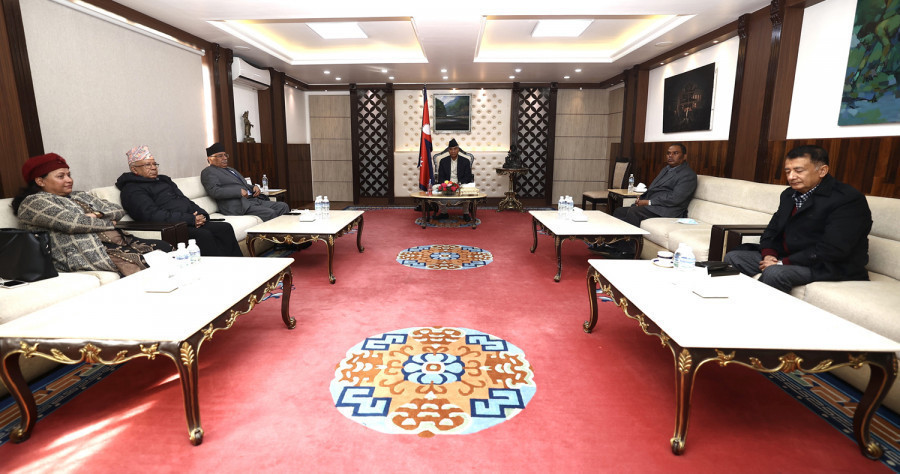Politics
People’s issues ignored as parties are overly fixated on power
One year since adopting their common minimum programme, the ruling parties have never discussed the commitments.
Purushottam Poudel
Over the past few weeks, the ruling coalition has been regularly discussing distribution of seats for the upcoming general and provincial elections slated for November 20.
The current government led by Nepali Congress President Sher Bahadur Deuba came to power in July last year, unseating KP Sharma Oli, the chairman of the CPN-UML.
The five parties in the ruling coalition have decided to fight the elections together under an alliance. But seat-sharing has become a major headache for them.
Experts say while it may be within their prerogative to discuss their seat-sharing arrangements, such talks ad nauseum ignoring the governance issues and the concerns of the common populace set a bad example.
Former Speaker Daman Nath Dhungana says politics in Nepal has solely become an exercise to remain in power and politicians are so obsessed with power games that they have forgotten the fact that public service is also their duty.
“Nepali politicians have become self-centred, concerned only about themselves,” said Dhungana.
One of the key issues the country currently needs to address is the economy. Inflation has skyrocketed. Governance of the current coalition government has been poor.
Recently, Oli, the leader of the main opposition, drew the attention of Prime Minister Deuba to the rising inflation.
The government, however, appears to be indifferent.
No decisions at the policy level concerning the general populace have been taken in the recent past.
While coalition leaders seem to be heavily invested in deciding seats for their parties, a high-level coordination committee, led by Congress senior leader Ramchandra Poudel to assist and advise the government, too seems to be active only in political affairs.
The ruling parties in November last year formed the committee for inter-party discussions on important national issues. However, the committee has barely discussed issues of people's concern. The entire focus of the panel has been on seat-sharing—for the local elections earlier and for the upcoming polls of the House of Representatives and provincial assemblies, now.
Along with inflation, farmers are in distress due to insufficient rainfall and a shortage of chemical fertilisers, the victims of loan sharking are on regular protests for a month now and the academic institutions including country’s oldest Tribhuvan University have been paralysed due to several protests.
The five ruling parties in August 2021, a month after the formation of the government, had prepared a common minimum programme listing out the plans their government would accomplish.
In addition to combating the Covid pandemic effectively, promoting national interest, strengthening federalism, maintaining law and order, ensuring good governance, concluding the remaining tasks of the peace process, boosting the economy and strengthening the country's diplomatic relations were the focus of the common minimum programme.
However, one year since it was adopted, the ruling parties have never discussed their commitments.
“We haven’t reviewed how much of the commitments have been implemented,” Mahendra Raya Yadav, co-chair of the Nepal Samajbadi Party who was a member of the common minimum programme drafting committee, told the Post. “However, some of the commitments like the amendment to the Citizenship Act and revision of the transitional justice Act have begun. So are other issues. Some of the issues haven’t been implemented because of the opposition’s objection.”
Against Yadav’s claim, the government is either reluctant or has failed when it comes to police adjustments, making public the report of the Lal commission on the atrocities in the protests in the lead up to the constitution promulgation, controlling inflation and making chemical fertilizers available to farmers, all of which are listed on the common minimum programme.
However, the alliance partners haven’t discussed why these commitments have not been implemented.
“Our politicians do not seem to be interested in the public’s concerns,” said Tilak Rawal, a former central bank governor. “Their sole focus is on forming a political alliance with the ultimate goal of power accumulation.”
Rawal said it’s strange that the economy has not been an agenda of Nepal’s governing parties despite the fact that it has emerged as a major challenge to the entire world.
“Due to multiple reasons, the world is going to face the inflation crisis and Nepal won’t remain untouched,” Rawal told the Post. “It is the responsibility of the politicians to hold serious discussions on the matter, as this directly hits the poor.”
The five parties in the ruling coalition—the Nepali Congress, the CPN (Maoist Centre), the CPN (Unified Socialist), the Janata Samajbadi Party and the Rastriya Janamorcha—for the past few weeks have been working out to divide 165 directly elected seats among them. With every constituent eyeing “more” seats, they have failed to reach a consensus.
Experts say their discussions focusing on power ignoring the public’s concerns have reached a sickening level.
“The parties are not just forming alliances but also ready contesting under the election symbol of other parties because they don’t dare to contest the polls alone,” Meena Vaidya Malla, a professor and former chief of the Central Department of Political Science at the Tribhuvan University, told the Post. “Only if they were concerned about people when in power, they could have gone to the people alone.”
In principle, politicians are expected to serve the people through appropriate policies and decisions. People elect representatives so that once elected, they will work to address the concerns of the citizens.
“When politics becomes solely a tool to control power, people suffer,” said Dhungana, the former Speaker. “That’s what is happening in Nepal.”




 20.12°C Kathmandu
20.12°C Kathmandu















